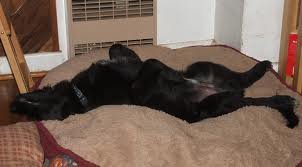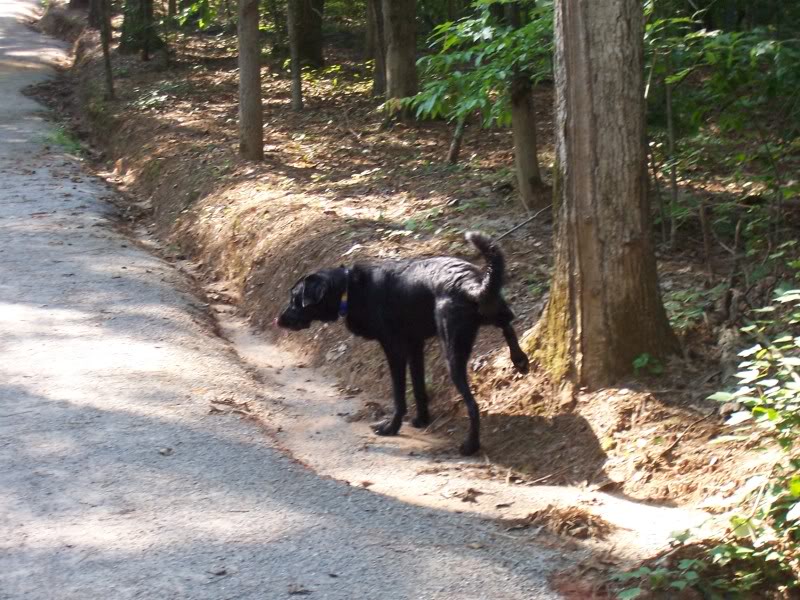Rich_by_the_Bay
Moderator Emeritus
Sorry this excerpt is so long, but it is both interesting and important. Caution: do not read this before a meal...
Bottom line: dogs can sniff out colon cancer. Quite well, it appears.
Bottom line: dogs can sniff out colon cancer. Quite well, it appears.
Sonoda H, Kohnoe S, Yamazato T, et al. Colorectal cancer screening with odour material by canine scent detection. Gut. 2011 Jun;60(6):814-9.
Abstract
OBJECTIVE: Early detection and early treatment are of vital importance to the successful treatment of various cancers. The development of a novel screening method that is as economical and non-invasive as the faecal occult blood test (FOBT) for early detection of colorectal cancer (CRC) is needed. A study was undertaken using canine scent detection to determine whether odour material can become an effective tool in CRC screening.
DESIGN: Exhaled breath and watery stool samples were obtained from patients with CRC and from healthy controls prior to colonoscopy. Each test group consisted of one sample from a patient with CRC and four control samples from volunteers without cancer. These five samples were randomly and separately placed into five boxes. A Labrador retriever specially trained in scent detection of cancer and a handler cooperated in the tests. The dog first smelled a standard breath sample from a patient with CRC, then smelled each sample station and sat down in front of the station in which a cancer scent was detected.
RESULTS: 33 and 37 groups of breath and watery stool samples, respectively, were tested. Among patients with CRC and controls, the sensitivity of canine scent detection of breath samples compared with conventional diagnosis by colonoscopy was 0.91 and the specificity was 0.99. The sensitivity of canine scent detection of stool samples was 0.97 and the specificity was 0.99. The accuracy of canine scent detection was high even for early cancer. Canine scent detection was not confounded by current smoking, benign colorectal disease or inflammatory disease.
CONCLUSIONS: This study shows that a specific cancer scent does indeed exist and that cancer-specific chemical compounds may be circulating throughout the body. These odour materials may become effective tools in CRC screening. In the future, studies designed to identify cancer-specific volatile organic compounds will be important for the development of new methods for early detection of CRC.
Abstract
OBJECTIVE: Early detection and early treatment are of vital importance to the successful treatment of various cancers. The development of a novel screening method that is as economical and non-invasive as the faecal occult blood test (FOBT) for early detection of colorectal cancer (CRC) is needed. A study was undertaken using canine scent detection to determine whether odour material can become an effective tool in CRC screening.
DESIGN: Exhaled breath and watery stool samples were obtained from patients with CRC and from healthy controls prior to colonoscopy. Each test group consisted of one sample from a patient with CRC and four control samples from volunteers without cancer. These five samples were randomly and separately placed into five boxes. A Labrador retriever specially trained in scent detection of cancer and a handler cooperated in the tests. The dog first smelled a standard breath sample from a patient with CRC, then smelled each sample station and sat down in front of the station in which a cancer scent was detected.
RESULTS: 33 and 37 groups of breath and watery stool samples, respectively, were tested. Among patients with CRC and controls, the sensitivity of canine scent detection of breath samples compared with conventional diagnosis by colonoscopy was 0.91 and the specificity was 0.99. The sensitivity of canine scent detection of stool samples was 0.97 and the specificity was 0.99. The accuracy of canine scent detection was high even for early cancer. Canine scent detection was not confounded by current smoking, benign colorectal disease or inflammatory disease.
CONCLUSIONS: This study shows that a specific cancer scent does indeed exist and that cancer-specific chemical compounds may be circulating throughout the body. These odour materials may become effective tools in CRC screening. In the future, studies designed to identify cancer-specific volatile organic compounds will be important for the development of new methods for early detection of CRC.



